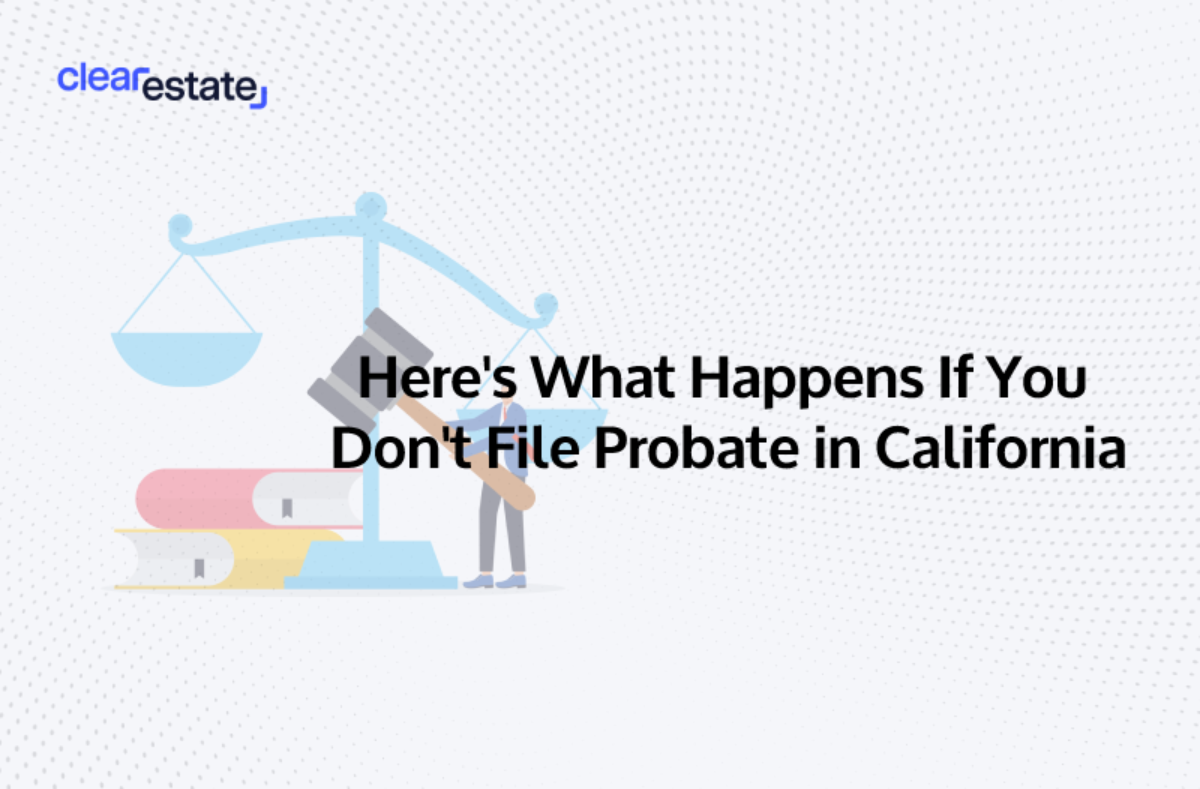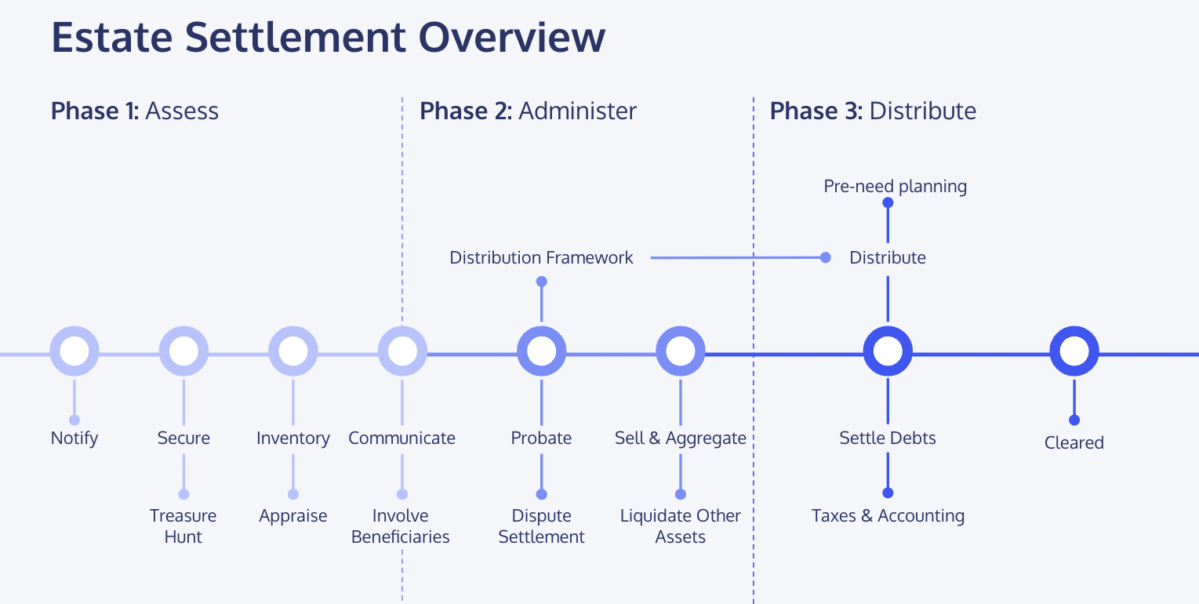Estate Settlement
Dec 04, 2024
How to Stop Mail for a Deceased Person: 5 Steps
Learn how to stop mail for a deceased person with our 5-step guide to protect their identity and ease estate management.
Failing to file for probate in California can cause frozen assets, prolonged creditor claims, and possibly legal issues for an Executor. read on to learn more.


Probate in California is a lengthy and at times - a costly legal process that involves administering the estate of a deceased person. In short, this process appoints an executor/administrator to pay debts, and distribute assets of the deceased according to the will or California probate law.
Formal probate is necessary if the decedent died on April 1, 2022, or later, probate will be required if the estate is valued above $184,500.
If the decedent died before April 1, 2022, probate will be required if the estate is valued above $166,250.
The probate process in California involves several steps, starting with filing a Petition for Probate. This petition can vary depending on whether there's a will and who is applying to administer the estate. The executor of the will is required to submit it to the probate court and notify the executor or beneficiaries. In the absence of a will, the court appoints an administrator.

Filing for probate is crucial as it legally recognizes a person's death, helps in settling debts, and facilitates the orderly distribution of assets. The process includes notifying creditors, preparing an inventory of the estate, and eventually distributing the assets. It ensures legal clarity and fairness in handling the deceased’s estate.
Probate is a critical legal procedure, essential in the aftermath of a person's passing. It serves as a court-supervised process for transferring assets, ensuring rightful ownership and settling debts.
Here's what you need to know:
When is Probate Necessary?
Initiating Probate:
Administrative Responsibilities:
Post-Filing Procedures:
Asset Management and Debt Settlement:
Finalizing Probate:
Probate, a cornerstone in estate administration, ensures a transparent and legal transfer of assets, providing closure to both legal and familial aspects of asset distribution.
Failing to file for probate in California can lead to the court freezing the decedent's assets, preventing access by heirs and imposing extended liabilities on the estate.
This inaction invites legal and financial complications, including civil penalties for executors and prolonged creditor claims.
Understanding the full scope of these repercussions is crucial for executors and beneficiaries to grasp the potential severity of delaying or avoiding probate proceedings
Civil and Criminal Consequences:
Executors who don’t file for probate might face civil penalties, including being held liable for damages caused to the estate or beneficiaries due to mismanagement or delays.
Moreover, criminal consequences can include charges for wrongfully taking possession of estate assets or intentionally concealing a will.
Extended Creditor Claims:
Without probate, creditors of the decedent have extended periods to file claims against the estate, potentially leading to larger debts being levied against the estate assets.
Financial and Banking Impediments:
An executor cannot legally access the decedent’s bank accounts or other financial resources to pay off debts and manage expenses, leading to financial limbo for the estate and it's beneficiaries/creditors.
Asset Transfer and Title Issues:
Property and other assets cannot be legally transferred to heirs or beneficiaries, keeping them tied up indefinitely.
Personal Financial Liability:
Executors who fail in their duties could be held personally liable for the financial harm caused to the estate or heirs, including additional expenses and diminished asset values.
Risk of Removal and Legal Action:
Other beneficiaries can take legal action to have an executor removed for failing to adhere to their fiduciary duties. This can involve a court-mandated accounting of the executor's actions and decisions.
Estate “Abandonment” and Freezing of Assets:
Estates not probated within a year are considered "abandoned," leading to frozen assets and complicating the legal process for asset release.
Failing to Alert Courts:
Executors who don't file the will can be held liable for damages to those who would benefit from the estate, emphasizing the responsibility to alert the courts of a decedent's death and existence of a will.
Tax Liabilities:
Executors are also responsible for settling the deceased's tax obligations. Neglect in this area can attract liens from the IRS against the estate.
Not filing for probate can expose executors to a range of legal and financial liabilities, including personal liability, asset mismanagement, and potential criminal charges.
The implications underscore the importance of adhering to probate filing requirements in estate management.
Certain assets bypass the need for probate. These include life insurance proceeds, retirement accounts, and bank accounts with named beneficiaries, as well as property in a living trust.
Joint tenancy property and community property with the right of survivorship pass directly to the surviving owner or spouse/partner, avoiding probate. This can get complicated depending on the specific type of ownership and the presence of a will.
Other benefits, like social security survivor benefits or benefits as a dependent of a deceased veteran, can usually be collected without involving the probate court.
Estates valued at $166,250 or less or $184,500 or less may qualify for a non-formal probate case, allowing for a simplified transfer process. This limit is based on the value of the property at the date of death, excluding certain types of assets like vehicles, property outside California, and joint tenancy property.
The process includes using an affidavit to transfer personal property if certain conditions are met, like the passing of 40 days since the death and agreement among all inheritors.
Jointly owned properties or assets are not subject to probate if one owner passes away, as the right of survivorship automatically transfers ownership to the surviving party.
Payable-on-Death (POD) and Transfer-on-Death (TOD) accounts also bypass probate, allowing beneficiaries immediate access upon the owner’s death.
This procedure applies to estates with total assets valued below certain thresholds. It includes a straightforward method of transferring property without a full probate process, using a declaration or affidavit after a specific time following the decedent’s death.
Spouses or domestic partners can use a Spousal or Domestic Partner Property Petition for a court order determining their share of the property, potentially avoiding a more complicated probate process.
Failing to apply for probate can lead to numerous challenges, including legal disputes, delayed asset distribution, and potential financial liabilities. Understanding the nuances of California's probate law is essential to avoid these pitfalls and ensure a smooth estate management process.
If you're facing uncertainties or concerns about the probate process, our team of experienced probate experts is here to help. We offer a free consultation to provide you with tailored advice and guide you through each step of the probate process in California.
Book a free consultation with us today and navigate probate with confidence and ease.
Yes, there is a time limit. Under California Probate Code section 8001, an individual named as an executor in a will is required to lodge the will and petition the court for estate administration within 30 days after they become aware of the death of the decedent and their own appointment as executor.
Failing to do so within this timeframe may result in the executor being deemed to have waived their right to appointment as a personal representative.
If probate is not filed in California, the court can freeze the decedent's assets, preventing access by heirs and beneficiaries.
This delay can lead to extended creditor claims, legal and financial complications for executors, including civil penalties, and challenges in managing the estate's assets and debts. It's important for executors to initiate probate proceedings to avoid these complications.
No, having a lawyer for probate in California is not a legal requirement. You can complete probate on your own. However, given the complexities of the process, consulting with an attorney or a probate consultant like ClearEstate can be beneficial to ensure that the probate process is handled correctly and efficiently. An attorney can provide guidance and help simplify the process.
 Simplify Probate Today
Simplify Probate Today
Get expert guidance from our specialists who've helped 10,000+ families.
Book a free consultation